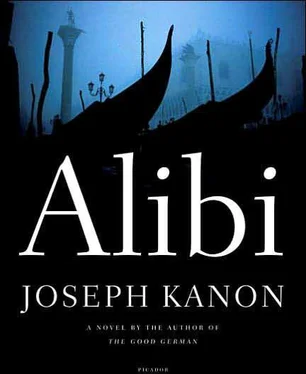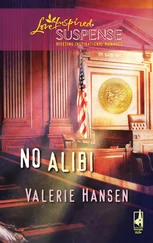Joseph Kanon - Alibi
Здесь есть возможность читать онлайн «Joseph Kanon - Alibi» весь текст электронной книги совершенно бесплатно (целиком полную версию без сокращений). В некоторых случаях можно слушать аудио, скачать через торрент в формате fb2 и присутствует краткое содержание. Жанр: Триллер, на английском языке. Описание произведения, (предисловие) а так же отзывы посетителей доступны на портале библиотеки ЛибКат.
- Название:Alibi
- Автор:
- Жанр:
- Год:неизвестен
- ISBN:нет данных
- Рейтинг книги:3 / 5. Голосов: 1
-
Избранное:Добавить в избранное
- Отзывы:
-
Ваша оценка:
- 60
- 1
- 2
- 3
- 4
- 5
Alibi: краткое содержание, описание и аннотация
Предлагаем к чтению аннотацию, описание, краткое содержание или предисловие (зависит от того, что написал сам автор книги «Alibi»). Если вы не нашли необходимую информацию о книге — напишите в комментариях, мы постараемся отыскать её.
Alibi — читать онлайн бесплатно полную книгу (весь текст) целиком
Ниже представлен текст книги, разбитый по страницам. Система сохранения места последней прочитанной страницы, позволяет с удобством читать онлайн бесплатно книгу «Alibi», без необходимости каждый раз заново искать на чём Вы остановились. Поставьте закладку, и сможете в любой момент перейти на страницу, на которой закончили чтение.
Интервал:
Закладка:
“None of them asked to meet me.”
She smiled. “Don’t make too much of that. It was for politeness. And now you want to go out with me?” she said, trying “go out.” “You don’t know anything about me.”
“I know your people go way back. So that’s all right. And you’re the first person I’ve enjoyed talking to since I got here.”
“But it’s you who are talking.”
I grinned. “Okay. You talk.”
“No, I have to go.”
“And leave me with them?” We turned. “Look, now it’s priests.” Bertie was greeting a priest in a flowing scarlet cassock, who extended his hand in a royal gesture, barely moving his head, standing in front of some unseen throne. “Who’s that? Do you know?”
“No.”
“I thought everybody here knew everybody. He must be a monsignor or a cardinal. Something. I wish I knew the difference. You’re from Rome-can you tell by the colors?”
“I don’t know. I’m a Jew,” she said quietly.
“Oh,” I said, turning back to her.
“Is that a problem?”
“Why should it be a problem?”
“Jews are not so popular. Not in America either, I think.”
“So you don’t know,” I said, ignoring it, “if he’s a monsignor.”
“No. Don’t you? You’re not a Christian?”
“I’m not anything. Not a Catholic, anyway.”
“But not a Jew either.”
“Part. My grandfather.”
“Miller?”
“Muller. Changed. My father was a mischling.”
“One grandfather.”
“It was enough in Germany.”
She looked at me, then held out her hand. “Thank you for the English. I have to go. It’s already dark. Do you see Signor Howard?” She glanced around the room.
“He’s getting the Church a drink. Come on, no one will miss us.”
“You’re leaving?”
“I’m taking you home.”
“No, it’s far.”
“Nothing’s far in Venice.”
She laughed. “How well do you know it?”
My mother intercepted us at the door, glass in hand.
“Darling, you’re not going. Gianni will be here any-He’ll be sorry to miss you.”
“Not too much.”
“Of course he will. Don’t be silly. The army certainly hasn’t done very much for your manners.”
“You say hi for me,” I said, pecking her on the cheek. “I have to run. This is Miss-I’m sorry, I don’t know your last name.”
“Grassini. Claudia Grassini,” she said, nodding to my mother.
“How nice,” my mother said, shaking her hand. “Finding someone new at one of Bertie’s parties. You probably think we’re the waxworks.”
“We have to run,” I said.
“Perhaps you’d like to join-” my mother started, looking carefully at Claudia, assessing.
“Another time,” Claudia said.
“Of course,” my mother said, a pas de deux. “Did you say goodbye to Bertie?” she said to me.
“He’s in confession.”
She giggled. “Oh, Bertie and his priests. You have to admit, though, he’s the best-dressed person in the room. How did they manage, do you think? During the war. I mean, did they have coupons?”
But by this time we were out the door, walking down the stairs to the hall.
“What was that all about?” I said to Claudia. “That look between you?”
“She’s a mother. She wants to see if I’m all right. You know, like in the market. You feel the fruit.”
I laughed. “How did you come out?”
“She’s not sure. She’s a widow?”
“For years.”
“What did he do, your father?”
“Have fun, mostly. Then he got sick.”
“Fun?”
“It was a different world. People did that then-have fun.”
“These people,” she said, lifting her head toward the stairs, then turning to the maid who was holding her coat. “You don’t have to do this. It’s a long way. I can meet you at the Accademia if you’d really like that.”
“No, I want to see where a real Venetian lives.”
“A poor one, you mean.”
“Are you?”
“Yes, of course. Who lives like this now?” she said, looking up the staircase to the piano nobile. “Only foreigners.”
We were alone at the vaporetto station, huddling in the corner against the cold. The fog had come in, blocking out the opposite side of the canal, so dense you felt you could snatch it in handfuls.
“So what do you do here?” she said, hunching her shoulders, hands stuffed in her pockets.
“Walk. See the city. What does anyone do in Venice? Meet people.”
“At Signor Howard’s?”
“You disapprove?”
“No, no. It’s not for me-” She stopped, then turned away, stamping her feet for warmth. “Signor Howard helped me, at the Accademia.”
“Bertie likes doing that. Helping people. But you still don’t like his friends.”
She looked up at me with a half smile. “Do you?”
“Not anymore. I’m not sure why. I mean, I’ve known some of them for years. It’s just that everything seems different now.”
“For you. Not for them.”
“No, not for them. It’s the same party.”
“I used to see them in the windows, from the canal-all the parties.”
“And now you’re inside.”
“You think so? Ha, brava. The international set. But now it’s like you-it’s all different. I don’t care.”
“I’m glad you went to this one, anyway.”
“Well, for Signor Howard. It was hard to get work when I came back from Fossoli.”
“Where?”
“A camp. Near Modena. Where they put the Jews.”
“There were camps here?”
“You think it was only in Germany? Yes, here. Beautiful Italy. Not so beautiful then.”
“When was this?”
“Forty-four. The first roundups were in forty-three. At the end. But I went later. It was a holding camp. From there, they shipped people on.”
“To Poland?”
She nodded. “So you know that. No one here does. No one here talks about it.”
“You?” I said, involuntarily looking down at her sleeve, as if I could see through to the tattooed numbers.
“No, I stayed at Fossoli.”
“So you were lucky,” I said, thinking of the piled-up carts.
“Yes, lucky,” she said, turning to a bright light coming toward us on the water. “At last. It’s so cold.”
The boat, finally visible through the mist, slammed against the dock.
Inside, we found seats toward the back, the windows steamy with condensation, so that it seemed the fog had moved in with us. There were a few other passengers, tired people going home with string bags, teenagers smoking. In the harsh light of the cabin everything seemed public again, the easy intimacy outside somehow part of the dark. The boat moved slowly, following the cone of its headlight, the motors groaning at the reduced speed, too loud for quiet conversation. But in the sudden warmth we were no longer hunched over. When Claudia sat back and crossed her legs, one came out of the coat, an unexpected flash of white, exposed.
“Do you live with your family?” I said, looking away from her leg.
“No, they’re dead. My mother years ago. My father just last year.”
“Oh,” I said, and then there was nothing to say, nothing worth saying over the engine anyway, drawing attention. Instead we sat quietly, suddenly awkward, rocking with the boat, the swaying movement pushing our bodies together so they barely met, then pulled back, like waves. It was a kind of dancing, a permission to touch in public, aware of each other, the warm skin under the coats.
The other passengers sat nodding to their own rhythm, looking up surprised when station lights suddenly appeared, then gathering their packages, unsteady on their feet until the ropes were tied. After San Marco the boat began to empty, until no one else was in the cabin but an old couple who appeared to be asleep. Outside, everything was still suspended in the fog, the lamps on the Riva just pinpricks of light.
Читать дальшеИнтервал:
Закладка:
Похожие книги на «Alibi»
Представляем Вашему вниманию похожие книги на «Alibi» списком для выбора. Мы отобрали схожую по названию и смыслу литературу в надежде предоставить читателям больше вариантов отыскать новые, интересные, ещё непрочитанные произведения.
Обсуждение, отзывы о книге «Alibi» и просто собственные мнения читателей. Оставьте ваши комментарии, напишите, что Вы думаете о произведении, его смысле или главных героях. Укажите что конкретно понравилось, а что нет, и почему Вы так считаете.












